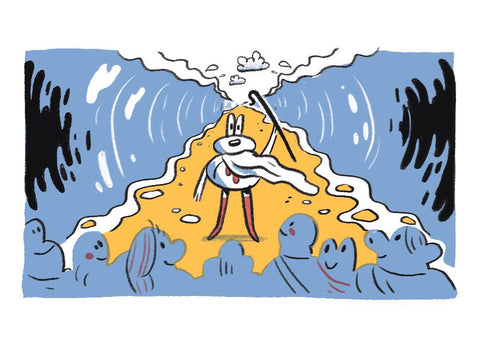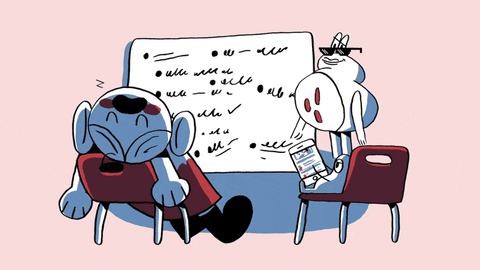ℹ️ Skip to key parts of the session by clicking on the chapter dots along the timeline.
“Tell us a rule, then show us someone breaking it” says Steve. “Now you’ve got my attention.”
Steve Rawling, Author of Storyteller Tactics, talks a group of Pip Club members through the Rules, Cheats & Rebels tactic. This tactic is great for creating anticipation and holding onto your audiences attention. It also makes a fantastic opener for a presentation or talk.
Each chapter of the video (above) shares a subheading with a chapter below, so feel free to browse the most important section for your needs, or just dive in and read/watch the whole session.
The power of rules
So why is it that rules are so useful when you tell stories?
Well, rules come up in stories all the time. One of the oldest stories we know is the story of the Garden of Eden. A beautiful garden, with one rule: don’t eat the apple! You can do anything else you like. Just not that.
You kind of know what’s going to happen - it’s just a question of who, and the outcome. If rules are introduced and not broken, it’s not a story.
When you hear a rule in a story, everyone is waiting for it to be broken.
If you create a rule, you create tension - so they're a powerful storytelling device.
The purpose of rules
The thing about rules is that if you divide the world into the known and the unknown, you end up with rules that help you maintain your comfort and safety in a familiar environment. But you also create a fascinating 'unknown' world outside of your everyday lift. Tune into the video for an example of this in action!
But there’s a hint here about how to choose the right rule for your story here. Which rule, if broken, brings that unknown world crashing into our reality, and what - if anything - can be learned from it?
Perhaps it’s a rule that you have observed through your experience at work. For example, “One thing I’ve learned in my five years as X”.
These rules represent the boundaries of the known world, and years of wisdom. And they don’t always get written down!
Why do we need rule breakers?
Well rule breakers matter because we can’t get by in just the known world. Comfort zones are great, but they make you slow and lazy and then you become extinct.
If you only follow the rules, you won’t grow. You won’t become wiser. Rules are limiting.
Every time a rule is broken, there’s a chance to learn something new. And stories are, to a large extent, about imparting new knowledge, ideas or perspectives. So a rule break can be the moment that opens up a whole new world.
An insightful comment from Ahmed, one of the Pip Club attendees: “People like change. They don’t like to be change”.
Starting your story
You start with the rule. You want people to realise the value of the wisdom that you are sharing.
When you state the rule, you are sowing the seed that someone is going to break it. You can start your sentence with “Everybody knows X’ as one way to do this.
So then you need to identify your rule breaker.
“Everybody knows X, but I…” did something different.
Building tension
So now everyone wants to know what happened next. There are only two possible outcomes! You succeed - or you fail. Any other options aren’t a story (so you'd need to identify a different Storyteller Tactic for your purpose!).
As on the card: you can either be a rebel or a cheat.
It’s very subjective, one person’s hero is another person’s villain. Watch the video for an example straight out of American reality TV! It features a guy who breaks a lot of social conventions… and yet, his actions are interpreted differently depending on the audience.
The ending: a rebel or a cheat? Reward, or punishment?
Regardless of which side you are on, acting selflessly is the mark of a rebel (think: Rosa Parks). Trying to achieve a higher goal by breaking rules, and often paying for it dearly. They’re not cheats and they don’t hide their actions.
The enemy in these scenarios is the rule itself, which needs to be abolished or updated.
So a cheat is a rule breaker who acts selfishly and hides their actions. For example, people being lazy or taking shortcuts at work to save themselves time or money at the expense of others.
As we watch people breaking the rules, we anticipate the possible consequences. We want to see the rebels succeed, and the cheat get punished. It’s great for engagement.
A perfect example of this is the way that (in the UK) we saw politicians set rules around lockdown; when they broke their own rules, there was widespread call for their punishment. It was a scandal - and it was riveting.
And that’s the power of this tactic. We pay attention to rules as they keep us safe, and rule breakers capture our focus even more. And if your rule/outcome is controversial? Well that just makes your audience even more interested.
Putting it into practice (and Q&A)
Here, Steve takes some of the examples of rules that the community shared earlier in the session and spins them into stories. He also answers some of the questions that have come in throughout the session.
“Don’t ignore the quietest person in the room”, by Dan.
It was an example from a workshop where Dan did ignore the quietest person in the room… until right at the end. Then, they dropped a bomb, and it would have been far better to get it out in the open at the start. It turned the session into a wasted hour for everyone!
So Steve builds this out into an (entirely fictional) story:
Dan’s a facilitator, he’s used to running all kinds of idea generation meetings. He’s getting contributions from a new project team, except for one guy in the corner.
Dan’s busy, stressed and rolling with it - so he breaks his own rule of not ignoring the quietest person. They start to wrap up the session by moving onto allocating actions.
The guy in the corner pipes up.
“You do realise there’s no budget for this, don’t you?”
And the room deflates.
A wasted session. Dan broke his own rule, for his own convenience (he’s a cheat!), and now he looks a fool.
“Can I create a rule to sell a nonsense product, and then ask my audience to help me break that rule? My audience would be the rebels and my salesman would be the cheater” - question from Viktor.
Yes - be creative! You can do whatever you like! But, if you’re working in an imaginary way - make sure your audience knows that. Use “Just imagine…” to set up the roleplay.
“Should there be a difference between breaking general rules, and breaking your own rules?” from Lisa.
Nope! Both can be done as a cheat (breaking your own rule to benefit yourself, regardless of the initial intention of the rule itself) or as a rebel (breaking your own rule for some higher ethical purpose, or as a way of growing and applying new wisdom).
Three types of rule
There is a card called Three Great Conflicts: we’re in conflict with ourselves, society and nature. You can take rules from all three of these.
- The rules you set yourself: “I always try to…”
- The rules other set for you (plenty of examples out there!)
- The laws of nature, or of higher powers
And when you break your own rule? You’ll kick yourself, or you’ll learn something new. If you break society’s rules, you either get punished (a cheat) or you learn or improve something (a rebel).
But what about nature? Can you break a law of nature (or higher powers, like religion)? You can try (Icarus tried!). People set themselves against them all the time - and we really pay attention to stories about this.
And that’s a wrap!
Don't forget to join Pip Club to get updates, recaps and event invites so you can be a part of the next walk-through. It's full of friendly, smart professionals (like Eve Laforest, who kindly shared her notes on this session with the other attendees). It's a great place to be!









